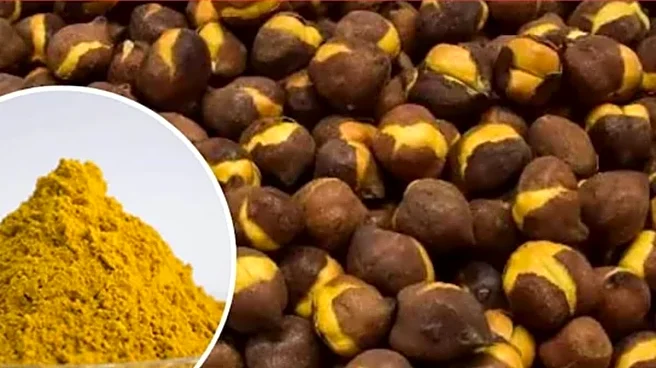Roasted chana (gram) is often considered a healthy snack, but some varieties sold in the market may put you at risk of serious diseases, including cancer. The culprit is a chemical called auramine, which
is added to make the chickpeas look shiny and yellow.
Following several reports of auramine-tainted grams, Shiv Sena MP Priyanka Chaturvedi wrote to the Union Health Minister, urging a nationwide investigation and strict enforcement.
What Is Auramine?
Auramine is an industrial dye used for colouring fabrics and leather. It should never be added to food, as research shows it can increase the risk of liver, kidney, and bladder cancers, as well as cause nervous system disorders.
Pregnant women and children are especially vulnerable.
Health Risks Of Auramine
Consuming auramine can:
- Raise the risk of liver cancer, bladder cancer, and stomach tumours
- Affect liver function and increase enzyme levels, potentially leading to cirrhosis
- Impair kidney filtering
- Cause headaches, dizziness, and general weakness
- In children, trigger vomiting, stomach pain, and diarrhoea
Recent Cases And Market Concerns
In 2025, tests in Maharashtra, Delhi, and Uttar Pradesh found auramine in several roasted gram samples. The problem is particularly common in street food and local markets, where small vendors are less monitored.
A viral video from November 2025 showed market grams turning into powder when pressed and appearing unusually shiny and yellow, a clear sign of auramine adulteration.
How To Identify Adulterated Chana At Home
You can check chickpeas yourself:
- Real roasted grams: small, naturally brown, and firm; do not break when pressed
- Adulterated grams: larger, shiny yellow, and crumble into powder when pressed
- Water test: soak grams in a glass of water; if the yellow colour dissolves, they are adulterated
Regulations And Enforcement
Under FSSAI rules, auramine and other such industrial dyes are completely banned. Only approved food colours may be used under the Food Safety Act 2006. FSSAI regularly collects market samples for testing, particularly during festival seasons.
However, MP Priyanka Chaturvedi has warned that monitoring in unorganised markets is weak, and adulteration remains a serious problem.
Legal Consequences Of Food Adulteration
Adulterating food is a criminal offence. Under Section 59 of the FSSAI Act, if adulteration results in death or serious injury, offenders can face 7 years to life imprisonment and a minimum fine of Rs 1 million.
Repeat offenders risk harsher penalties and licence cancellation.


/images/ppid_59c68470-image-177091003748320658.webp)

/images/ppid_59c68470-image-177091003360947404.webp)




/images/ppid_a911dc6a-image-177090947694860619.webp)

/images/ppid_a911dc6a-image-177090903771179733.webp)
/images/ppid_a911dc6a-image-177090914459231728.webp)


